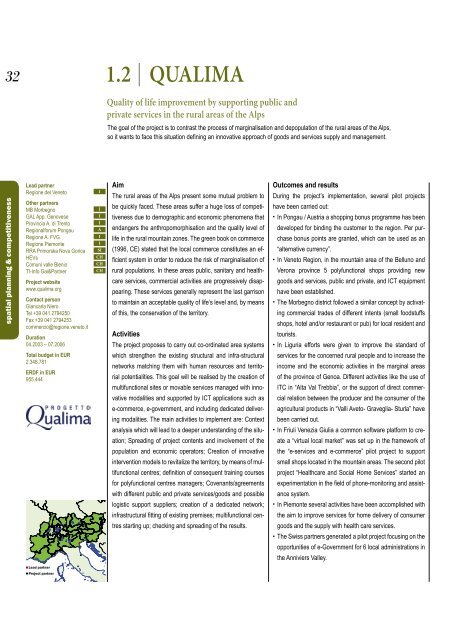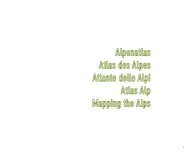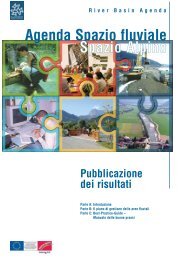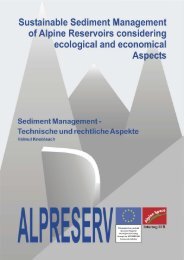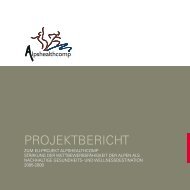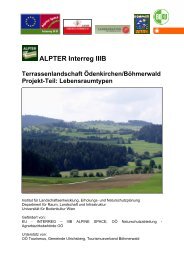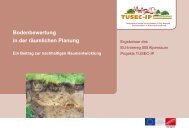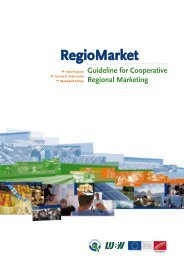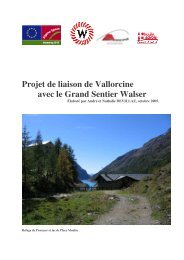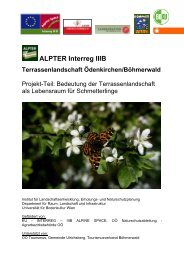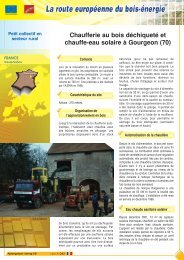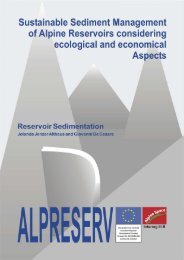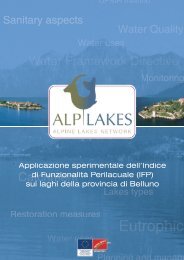1.2 - INTERREG IIIB Alpine Space Programme
1.2 - INTERREG IIIB Alpine Space Programme
1.2 - INTERREG IIIB Alpine Space Programme
Create successful ePaper yourself
Turn your PDF publications into a flip-book with our unique Google optimized e-Paper software.
32 <strong>1.2</strong> QUALIMA<br />
spatial planning & competitiveness<br />
Lead partner<br />
Regione del Veneto<br />
Other partners<br />
MB Morbegno<br />
GAL App. Genovese<br />
Provincia A. di Trento<br />
Regionalforum Pongau<br />
Regione A. FVG<br />
Regione Piemonte<br />
RRA Primorska Nova Gorica<br />
HEVs<br />
Comuni valle Blenio<br />
TI-Info Gai&Partner<br />
Project website<br />
www.qualima.org<br />
Contact person<br />
Giancarla Niero<br />
Tel +39 041 2794250<br />
Fax +39 041 2794253<br />
commercio@regione.veneto.it<br />
Duration<br />
04.2003 – 07.2006<br />
Total budget in EUR<br />
2.348.781<br />
ERDF in EUR<br />
955.444<br />
Lead partner<br />
Project partner<br />
I<br />
I<br />
I<br />
I<br />
A<br />
I<br />
I<br />
SI<br />
CH<br />
CH<br />
CH<br />
Quality of life improvement by supporting public and<br />
private services in the rural areas of the Alps<br />
The goal of the project is to contrast the process of marginalisation and depopulation of the rural areas of the Alps,<br />
so it wants to face this situation defining an innovative approach of goods and services supply and management.<br />
Aim<br />
The rural areas of the Alps present some mutual problem to<br />
be quickly faced. These areas suffer a huge loss of competitiveness<br />
due to demographic and economic phenomena that<br />
endangers the anthropomorphisation and the quality level of<br />
life in the rural mountain zones. The green book on commerce<br />
(1996, CE) stated that the local commerce constitutes an efficient<br />
system in order to reduce the risk of marginalisation of<br />
rural populations. In these areas public, sanitary and healthcare<br />
services, commercial activities are progressively disappearing.<br />
These services generally represent the last garrison<br />
to maintain an acceptable quality of life’s level and, by means<br />
of this, the conservation of the territory.<br />
Activities<br />
The project proposes to carry out co-ordinated area systems<br />
which strengthen the existing structural and infra-structural<br />
networks matching them with human resources and territorial<br />
potentialities. This goal will be realised by the creation of<br />
multifunctional sites or movable services managed with innovative<br />
modalities and supported by ICT applications such as<br />
e-commerce, e-government, and including dedicated delivering<br />
modalities. The main activities to implement are: Context<br />
analysis which will lead to a deeper understanding of the situation;<br />
Spreading of project contents and involvement of the<br />
population and economic operators; Creation of innovative<br />
intervention models to revitalize the territory, by means of multifunctional<br />
centres; definition of consequent training courses<br />
for polyfunctional centres managers; Covenants/agreements<br />
with different public and private services/goods and possible<br />
logistic support suppliers; creation of a dedicated network;<br />
infrastructural fitting of existing premises; multifunctional centres<br />
starting up; checking and spreading of the results.<br />
Outcomes and results<br />
During the project’s implementation, several pilot projects<br />
have been carried out:<br />
In Pongau / Austria a shopping bonus programme has been<br />
developed for binding the customer to the region. Per purchase<br />
bonus points are granted, which can be used as an<br />
“alternative currency”.<br />
In Veneto Region, in the mountain area of the Belluno and<br />
Verona province 5 polyfunctional shops providing new<br />
goods and services, public and private, and ICT equipment<br />
have been established.<br />
The Morbegno district followed a similar concept by activating<br />
commercial trades of different intents (small foodstuffs<br />
shops, hotel and/or restaurant or pub) for local resident and<br />
tourists.<br />
In Liguria efforts were given to improve the standard of<br />
services for the concerned rural people and to increase the<br />
income and the economic activities in the marginal areas<br />
of the province of Genoa. Different activities like the use of<br />
ITC in “Alta Val Trebbia”, or the support of direct commercial<br />
relation between the producer and the consumer of the<br />
agricultural products in “Valli Aveto- Graveglia- Sturla” have<br />
been carried out.<br />
In Friuli Venezia Giulia a common software platform to create<br />
a “virtual local market” was set up in the framework of<br />
the “e-services and e-commerce” pilot project to support<br />
small shops located in the mountain areas. The second pilot<br />
project “Healthcare and Social Home Services” started an<br />
experimentation in the field of phone-monitoring and assistance<br />
system.<br />
In Piemonte several activities have been accomplished with<br />
the aim to improve services for home delivery of consumer<br />
goods and the supply with health care services.<br />
The Swiss partners generated a pilot project focusing on the<br />
opportunities of e-Government for 6 local administrations in<br />
the Anniviers Valley.


